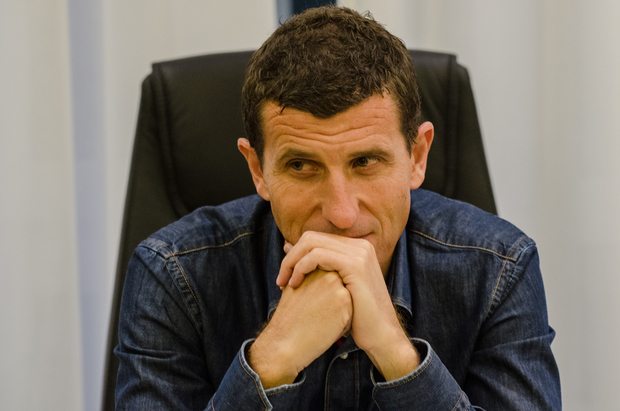Javier Gracia: ‘Are Russian players lazy? Maybe at other clubs, but not at Rubin’
Yesterday Rubin was going to have the most difficult match of the season against Zenit from Petersburg at Petrovsky. And the head coach of the Kazan club gave an interview to the editorial staff of Realnoe Vremya before the match and told what surprised him in Russian football the most. Formations of the clubs of the Russian Football Premier League, limit on the number of foreign players and who of the Russian players would play at Rubin in case of its cancellation. Song, Kambolov and Ozdoev, and why the move to Kazan after his work at Málaga was a coaching challenge. These and other topics became the main matter of the talk of Javier Gracia with our correspondent.
'No one uses this formation in Spain'
At the beginning of the season, Rubin played five matches out of six with the teams who were 'secondary'. Now you will play against Zenit who will attack. Will you change positions or do you depend on your team?
Everybody depends on his or her team, me too. But a rival is to be taken into account. Changes are needed. We know if Zenit is given freedom, the team has to give way and give the initiative. It should be understood how and where pressing is, and how to defend. We will have to spend some time near our goals. Apart from it, the team must attack. In this game we will have more opportunities for counterattacks and more zones in the rivals' half of the pitch. We should follow the development of the game, what zones the rival will have, try to create danger near the rival's goals.
Rubin is the only team in the League to use the 4-4-2…
What about CSKA? Or is Yeremenko behind?
They are using the 4-2-3-1. Last year they had a diamond in the centre. No one of the League chooses the classical formation. Why does the 'football originators' formation' is not in vogue in Russia?
(Thinking). Yes. As for the vogue, the 5-3-2 is popular in Russia now because of Rostov's success in the last season. No one uses this formation in Spain. Only Alaves can choose it in a game against Barcelona. If a team plays against a strong team, it can field five defenders. And the formation I am using, taking into account the players' qualities, allows to reach the greatest balance on the pitch. Moreover, we should start with certain players. If we choose the 4-4-2 and look at the right wing back, we should understand we are speaking about either Bauer or Ustinov. Depending on a player, a formation changes. It won't be static. All formations are a relative thing, it depends on the players.
Whom the limit on the number of foreign players should 'sacrifice' for
In every match fans and journalists try to guess what position señor Garcia will 'sacrifice' for the limit on the number of foreign players. Does this problem exist?
Sure, it is a new situation for me. A good analysis is needed before making a decision. It is not only difficult to choose a foreigner for sacrifice. I should think about it during a match, and make changes depending on the course of the game. It is an uneasy task, a puzzle for a coach. I have to think it over: if this player leaves this position, who will play here? It is not a usual task of a coach when you just choose the best players at a certain moment.
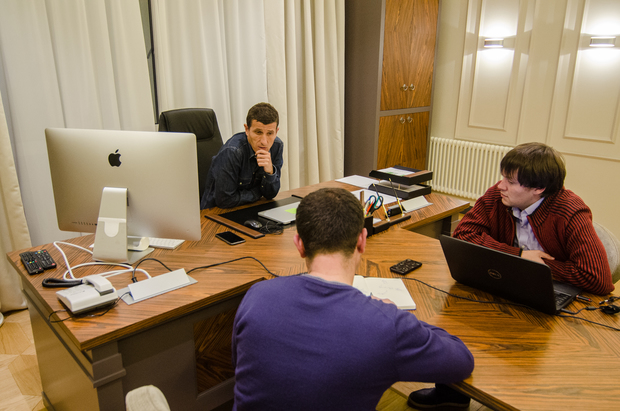
Depending on a player, a formation changes. It won't be static. All formations are a relative thing, it depends on the players.
Tell the truth, if the limit did not exist, who of the Russians would be in the first team of Rubin regularly except Ryzhikov?
No one has a guarantee that he will be fielded. But I think that, for example, Maksim Kanunnikov is demonstrating a very good level. Denis Tkachuk is useful. I can also mention Ozdoev, Nabiullin, Burlak. Every player has good and bad luck. As a coach, I have to choose a moment when a player shows his best qualities. In addition, I need to keep my mind on the limit.
The Russian Football Union President insinuated the limit on the number of foreign players will be lifted in the next season. Does it mean the above-mentioned players will also be in the first team?
You have very uncomfortable questions (smiling). I don't know. It depends on how this limit will look like. If it turns out that only six players can be in the first eleven, the format won't change. I can say that all Russians, and not only those whom I have mentioned, are in the team because they have quite a high level. And they will show this level.
'At Málaga, we brought players up, their price went up, then they were sold'
You worked at Almeria, Osasuna, Málaga in La Liga. All clubs are not well-off. How should one create a dream team?
Every team has its own peculiarities besides this factor. There were constant changes in the first teams at these clubs. In this situation, a coach should pay attention to young players in order to bring them to the first team. In the season when I joined Málaga, Jesús Gámez went to Atlético Madrid. In other words, many celebrated players left the club, and we paid attention to 20-year-old players like Juanli, Juanmi, Castillejo, Samuel García. We worked with them, they demonstrated their best qualities. Their price in the market grew. The club managed to sell these players. Such changes constantly took place there: we brought players up, their price went up, then they were sold, and we had to work with new and new players. Pablo Forlán was one of those players who joined the first team. And at the end of the last season, he was in the first team of the national team of Spain. Clubs with little money can oppose great clubs due to their work. I always counted on these guys: young, hungry who work with a great desire and are ready to do their best on the pitch. Coaching potential is revealed due to a competition with richer clubs.
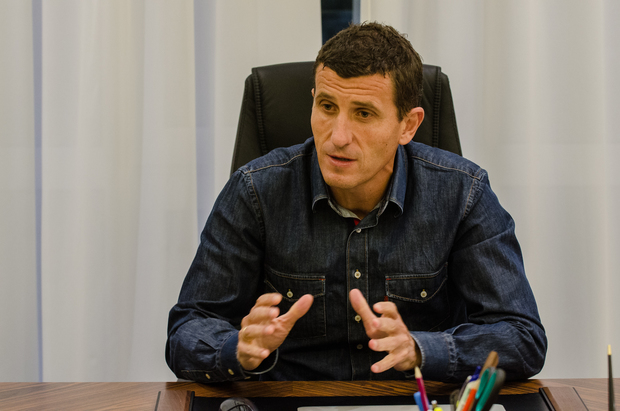
I knew about the project that is created. I knew what Rubin is like. <...> It was a professional challenge, a personal challenge, a challenge for the whole family. But I am sure this experience will make me a better coach.
Is the work at Rubin an opportunity to work in completely new conditions for you in terms of relative financial freedom while creating a team?
The situation I worked at Málaga in was more than comfortable. I worked there two years, then I was offered a new contract. I had quite good terms. There was not any motive to leave the Spanish championship immediately. In financial terms, the contract in Kazan is better, of course. Sports ambitions of the club also attracted me. I knew about the project that is created. I knew what Rubin is like. It is a team with a great history. I wanted to make my own contribution to the development of the club and favour my professional growth. It was a professional challenge, a personal challenge, a challenge for the whole family. But I am sure this experience will make me a better coach.
'Kazan lived up to the expectations'
Could you tell us about the first reaction of your family to the opportunity to move to Russia?
I shared the news with my wife before the final decision. She always was with me even when I was just a player. We understand that our common family life is around my profession. We learnt to enjoy our life regardless of constant trips. Moreover, such experience enriches as a human. As for Kazan, we did not know how our children would feel. All in all, we are glad about the decision we made, and we like the city very much.
You spoke well of everything as soon as you came. Has anything changed since then? Maybe something has disappointed you.
No, there are no disappointments. As for the city, now it seems to be mine, not strange. People are hospitable. Everything is great. But I always remember I came here to work. The city is beautiful. There is a desire to go for a walk, enjoy the city life. But it all takes a back seat because of my work. I almost have spare time. But when you find a couple of hours to be with your family on the riverbank or visit a restaurant to have a cup of coffee, you understand the city is very cosy and hospitable. I don't need much with my family. We are glad about what we have. The city not only lived up to the expectations, I am just impressed. The children are studying at the international school. Everything is alright. Speaking about the championship, I still think it is strong and competitive and difficult.
'Now the club has many players. We will need to correct it in the future as well'
In Russia, there is a stereotype that Russian football players are lazy and unprofessional. What is your opinion?
Probably these qualities refer to other teams, not to ours. Our players are different (smiling).
Without any exception?
They are less active. But such characteristics don't refer to them. On the contrary, if I had to characterise Russian football with several words, I would say capability for work, competitiveness and a great desire to work. I don't think they are lazy, they like working.
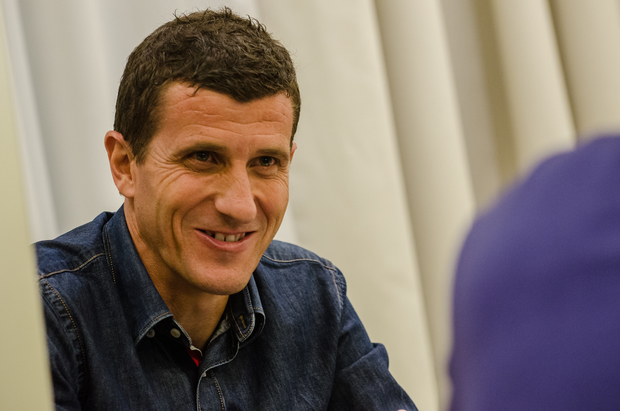
Our common family life is around my profession. We learnt to enjoy life regardless of constant trips. Moreover, such experience enriches as a human.
A summer transfer campaign has been a novelty for you. Your teams used to sell players, while Rubin purchases them. Have you discovered anything?
We have many players at our disposal. Some of them worked separately from the team, then joined it. Some of them could not be fielded. Some of them were not in shape. This is why we could not show our level in the first matches. I hope the situation will be changing as time goes by, and the players will be in their best form. In general, I am satisfied with the team and line-up. Now the club has many players. We will need to correct it in the future as well.
You started to play at Athletic Bilbao, which is the only team to stake only on the Basques. Is it possible nowadays?
Atletic differs from other clubs in Spain. As you have said, it doesn't have foreigners. While forming the team, Athletic uses the players of the Basque Country and Navarra, that is to say, the regions where the Basques live. Players who have played at Osasuna – a region of Pamplona – or at Real Sociedad appear at the club. The team uses its school Lesama. And Athletic is successful not only in the Championship of Spain but also in Europe recently. It was the champion of Spain in the 80s. It all makes the club unique and different from others.
'I even left my team one year in advance to become a coach'
Why did not you manage to join the national team of Spain and become a top player? Did you do your best or did you miss your boat?
I did not know the reasons at that moment. Probably if I did it, I would be at the top. I don't know. Maybe footballers were better than me at that time. Nevertheless, you are right to say that I played in the under-21 national team. I even participated in the selection for the 1992 Olympiad. I had amazing partners around me: Cañizares, Kiko and others. This squad won a gold medal in the Olympics. In principle, I was a footballer of the highest division of the Championship of Spain. I always dreamt of it. And I'm glad about my fate.
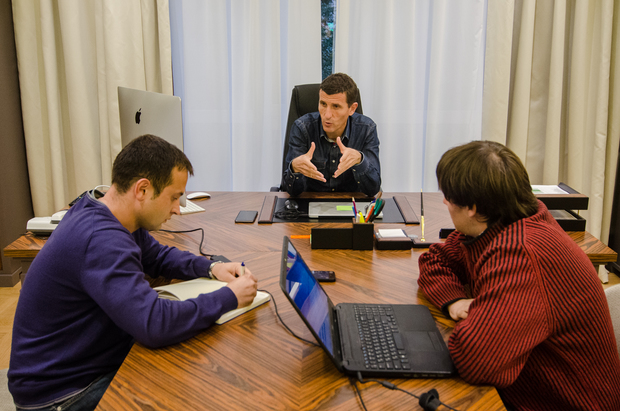
I wanted to become a coach very much. I tried and liked it. I'm glad that I have started another work that I enjoy much.
Players often become agents, managers, club functionaries after they stop playing. Why did you decide to become a coach?
I always was a team player, not an individualist, you know. When I was finishing my career, I immediately decided to become a coach. I even left my team one year in advance, though I could stay, I had a contract. There was an option to start a career as a coach. I started with the second team of Villareal. I wanted to become a coach very much. I tried and liked it. I'm glad that I have started another work that I enjoy much. When I was a player, I always observed how coaches worked. I did not have any example. But I looked how they worked and learnt.
'Corruption, corrupt referees, terrible pitches. I'm not good at these terms'
Initially, there were low divisions. In Russia, football in low divisions has corruption, corrupt referees, terrible pitches. What is the specifics of clubs of the Spanish La Segunda?
I'm not good at these terms (smiling). I know nothing about Russian divisions. It is difficult to say something. In Spain, a player who is not in La Liga finds it difficult to earn his living. I don't mean La Segunda: the organisation is quite good there, there are pitches, and football is healthy in all respects. The situation in La Segunda B is more complicated. In the third division, a player tries to choose a team closer to his home because he can't spend money on moves. But there is nothing from you have mentioned. I know nothing about fixed games.
What about a cooperation of bookmakers with players?
Bets in football have appeared recently. It is not a common thing yet. Bookmaker network is developed around the world. But I have never heard of a pressure on players in Spain.
I even envy you a bit. In conclusion, I have a series of quick-fire questions. Preferably not to think for long…
— One should always think…
— Exclusive this moment.
— (Smiling)
— Messi or Ronaldo?
— (After a pause) It's difficult to say. Jonathas and Kanunnikov.
— Pele or Ronaldo?
— I knew Ronaldo more.
— The Central Stadium or Kazan Arena?
— Kazan Arena.
— Russian bears or Spanish bull?
— Neither of them.
— Gattuso or Xabi Alonso?
— Xabi Alonso.
— Kambolov or Ozdoev?
— You have almost caught me! Both of them. It's like mum and dad.
— Your favourite football club.
— Rubin.
